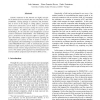Free Online Productivity Tools
i2Speak
i2Symbol
i2OCR
iTex2Img
iWeb2Print
iWeb2Shot
i2Type
iPdf2Split
iPdf2Merge
i2Bopomofo
i2Arabic
i2Style
i2Image
i2PDF
iLatex2Rtf
Sci2ools
136
click to vote
ISSRE
2008
IEEE
2008
IEEE
Detection and Prediction of Resource-Exhaustion Vulnerabilities
Systems connected to the Internet are highly susceptible to denial-of-service attacks that can compromise service availability, causing damage to customers and providers. Due to errors in the design or coding phases, particular client-server interactions can be made to consume much more resources than necessary easing the success of this kind of attack. To address this issue we propose a new methodology for the detection and identification of local resource-exhaustion vulnerabilities. The methodology also gives a prediction on the necessary effort to exploit a specific vulnerability, useful to support decisions regarding the configuration of a system, in order to sustain a certain attack magnitude. The methodology was implemented in a tool called PREDATOR that is able to automatically generate malicious traffic and to perform post-processing analysis to build accurate resource usage projections on a given target server. The validity of the approach was demonstrated with several sy...
Certain Attack Magnitude | ISSRE 2008 | Methodology | Particular Client-server Interactions | Software Engineering |
Related Content
| Added | 31 May 2010 |
| Updated | 31 May 2010 |
| Type | Conference |
| Year | 2008 |
| Where | ISSRE |
| Authors | João Antunes, Nuno Ferreira Neves, Paulo Veríssimo |
Comments (0)

